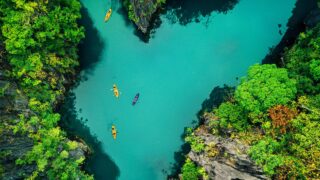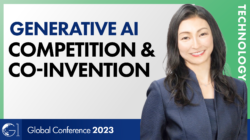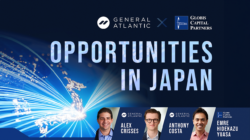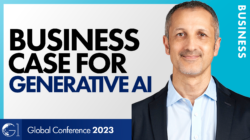Leadership with Passion through Kokorozashi
The key ingredient to success? Passion.
Finding your kokorozashi will unify your passions and skills to create positive change in society. This GLOBIS Unlimited course will help you develop the values and lifelong goals you need to become a strong, passion-driven leader.
Society has a lot of issues. And to solve them, we need leaders who can inspire others for social movements. But how do you become the type of inspiring leader who creates social change?
One thing that all great leaders have in common is the ability to tell the types of moving stories that bring people together. In his book, We Have A Dream: 201 Countries, 201 Dreams with Sustainable Development Goals, cofounder and CEO of World Road Taichi Ichikawa compiled moving stories from young leaders from around the globe. He recently shared some of the lessons he learned about storytelling along the way.
In this video, Ichikawa talks about SDGs, the power of storytelling in creating positive social change, and how to become a leader that challenges cultural norms. Below is a transcript of his keynote speech, edited for clarity. Watch the video above for a dialogue with GLOBIS lecturer and KIBOW managing director Reiji Yamanaka, as well as an audience Q&A.
Next Article
WE HAVE A DREAM: A Storybook of SDGs and Subjective Truth
How (and Why) Storytelling Is a Necessary Job Skill
5 Young Leaders Solving Sustainable Development Issues in the Philippines
The Inspiration behind the Book
Taichi Ichikawa: We Have A Dream started from one simple question. “What is your dream?” The book has been supported by young people and leaders worldwide, including Nobel Peace Prize laureates.
There are hundreds of life stories [in the book], so I will share what I learned. To explain, I’d like to start with my journey.
One day [when I was in school], I thought, “What will my future be?” I went to the school’s career guidance office to find out what I could expect for the future. The place was full of books about getting high scores and how to get into competitive universities. But what I needed were role models and life designs that would help me broaden my horizons and shift my focus from the present to the future. That didn’t exist at my school.
Eventually, I came across a book. This book was a collection of dreams from forty-seven high school students from forty-seven prefectures. It was wonderful.
Someone wrote about a dream to [contribute to the world]—that was similar to my dream. Someone wrote that they had no dream, but their dream was to find one. The book gave me confidence in my own voice. And this was one of the dots that connected and would later lead to my book, We Have A Dream.
Interest in Social Change
Ichikawa: After entering university, I thought I needed to broaden my world and travel to many countries, so I participated in One Young World in 2014. This was when my story moved forward. I met a brilliant person who changed my life. Her name is Yeonmi Park, and she escaped from North Korea.
At the age of thirteen, she escaped from North Korea because she was starving. When she tried to escape to China, her dad passed away, and her mom sacrificed herself to protect her. Her story left me shocked. After her speech, I asked her why she could continue to fight for the North Korean people even though her actions could put her at so much risk. She simply answered, “Because this is something only I can do.”
Since then, one question has been stuck in my head. “What is something only I can do?” My journey became all about finding my own passion. That’s why I built my own company and created the book—to do what only I can do. I finally found something I am happy to stake my life on.
How the Art of Storytelling Affects Leadership
Ichikawa: One thing that I noticed was that stories that reached people’s hearts always have the phrase, “I want,” rather than, “I should.”
When I said, “I want to create this book for the next generation,” more and more people said they wanted to make this book. Then it became, “We want to make this book.” So please start talking about what you want to do rather than what you should do. Make what you want into what we want.
When we tackle social issues, we tend to talk about what should be done, so bring your wants and connect them with social issues. That’s how you can pass your kokorozashi to others.
Leadership with Passion through Kokorozashi
The key ingredient to success? Passion.
Finding your kokorozashi will unify your passions and skills to create positive change in society. This GLOBIS Unlimited course will help you develop the values and lifelong goals you need to become a strong, passion-driven leader.
SDGs as Long-Term Social Change Goals
Ichikawa: Next, I’d like to talk about the difference between dreams and goals. To put this in the context of the SDGs, the book uses the analogy of mountain climbing. You naturally set a goal when you climb a mountain, right? Like a summit. This is because there is a view you want to see there. The view you want to see is your dream, and the summit or other destination is your goal.
The summit itself is a goal, not a dream, and SDGs are Sustainable Development Goals, so it is a goal. The interpretation here is that we think of the summit as a goal to be achieved to have a view that we want to see as the human race. When we hear about SDGs, especially from corporations, we often hear that the SDGs are difficult to understand, and then they say that these goals are too far away.
In such cases, please try to approach SDGs from the view of what you would like to see. What’s the kind of world you want to see? What kind of society do you want to see in the future?
The Secret to Reaching All Groups of People
Ichikawa: I’d like to share one last lesson.
What is the common language of this world? Is it English? For me, it’s not. “Oneness” is the universal language that lets us talk together.
As I shared with you, when I attended One Young World, I met Yeonmi. Her speech was only five minutes long, but people from all over the world gave her a standing ovation. When I left the venue, many people discussed what they could do to help people suffering in North Korea, like Yeonmi. Although their English levels were different, there was an overwhelming sense of ownership of the issue facing other countries. When I saw this, I realized what led their hearts to connect was not the language itself, but the sense of oneness.
When people have a sense of oneness, even if it is in broken English, they can talk to each other. What makes a person a global leader is more than language. It is the ability to have a sense of ownership of the issues affecting people in other countries—oneness. That is what I’d like to pass around, especially to the next generation.
There is a lot to be learned, especially from those affected by the issues. That’s why I have started my own business and continue creating books, documentaries, and other educational content to gather the world.
I hope you all learned something from my story and find some takeaways. I’d like to end with my favorite quote from One Young World: “The future is a contingent of now.”
Please create a better present while you are looking at the future.





